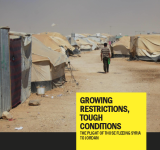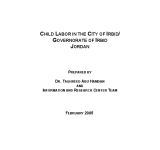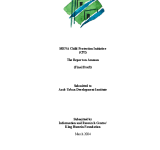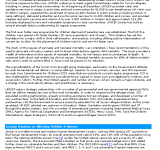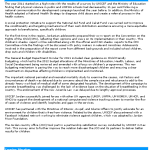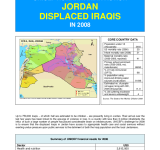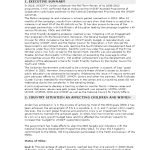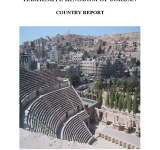يستند مضمون هذا التقرير المتعلق بالأردن إلى حد كبير إلى زيارة بحثية قامت بها منظمة العفو الدولية إلى البلاد في يونيو/حزيران 2013. وقد التقى وفد المنظمة بممثلي السلطات الأردنية ووكالات الأمم المتحدة والوكالات الإنسانية الدولية والمنظمات غير الحكومية والجمعيات الخيرية;; فضلاً عن أكثر من 150 لاجئاً من سوريا في مجتمعات اللجوء والمجتمعات المضيفة. ونشرت منظمة العفو الدولية هذا التقرير بهدف لفت الانتباه إلى الصعوبات التي يواجهها الفارون من سوريا طلباً للسلامة. وفي الوقت الذي يركز فيه التقرير بشكل رئييس على الأوضاع في الأردن;; فإنه يتضمن تحديثا للمعلومات التي كانت المنظمة قد نشرتها في السابق بشأن التحديات التي يواجهها اللالجئون من سوريا في البلدان المجاورة. وقد أمعنت منظمة العفو الدولية النظر في التحديات التي يواجهها اللاجئون في الأردن;; ولا سيما أولئك الذين يقطنون في مخيم الزعتري;; وهو أضخم مخيمات اللاجئين من سوريا في الأردن. وأجرت المنظمة تحقيقاً حول معاناة اللاجئين;; ليس من ظروف المعيشة القاسية في الصحراء فحسب;; وإنما أيضاً من ارتفاع معدلات الجريمة وغيرها من المخاوف الأمنية.
والصحة
This research study aims to investigate child labor in Irbid to provide a deep understanding of and knowledge about the socio-economic and cultural context of working children in Irbid. It also aims to propose intervention programs that maximize the effectiveness of the Family and Childhood Protection Society (FCPS);; an NGO in Irbid that works on issues related to children. Various study results have shown that children often work in dangerous and hazardous conditions where they are exposed to physical and psychological abuse;; in addition to exploitation in terms of minimal pay and long working hours. Both qualitative and quantitative methodologies were used to conduct the research presented in this report. In-depth interviews and questionnaires were used to collect data from all organizations working on child-related issues and from working children and their family members.
This report aims to review the status of children in Greater Amman and to conduct a capacity assessment of key institutions addressing children’s issues. Various issues are examined;; covering areas such as health;; education;; and socio-economic characteristics. This report also reviews the status of disadvantaged children;; including working children;; orphans;; refugees;; and children with disabilities;; in order to identify vulnerabilities and risk factors specific to them. Finally;; this report assesses the capacity of selected institutions addressing children’s issues in Greater Amman and proposes phased capacity building programs based on the findings of the assessment.
The annual report summarizes and evaluates the humanitarian and developmental assistance of the UNICEF Jordan Country Office (JCO) in 2012. The report also includes evaluation of the ongoing projects such as providing humanitarian aid for Syrian refugees in camps and host communities;; establishing foster care programme for children deprived of parental care;; and supporting advocacy work on children’s rights to education and women empowerment. The analysis of the report is based on the progress and assessment of the JCO’s projects in partnership with other organizations in relevant fields. In the report;; the limited capacity and number of social workers and lack of technical support from the government in budgeting and social policy reforms are identified as major obstacles.
The 2011 annual report provides a comprehensive summary of the ongoing projects by the UNICEF Jordan Country Office (JCO). The programmes and projects include social protection initiatives for the National Aid Fund and Zakat Fund;; national perinatal and neonatal mortality study and development of nationwide computerized violence tracking system. . The analysis of the report is based on the progress and assessment of the JCO’s projects in partnership with other organizations in relevant fields including the Ministries of Interior;; Awqaf and Islamic Affairs and other UN agencies (UNDP;; UNFPA;; UNWOMEN;; UNHCR and WHO). The report specifies the organization’s methodology in collecting data and evidence and monitoring mechanisms to track and assess programme progress. In evaluating the development of ongoing projects;; the report summarizes future work plans and examines critical factors and constraints in each project.
The aim of the report is to identify the critical issues of the Iraqi refugees in 2008;; especially the vulnerable groups of children and women and their humanitarian needs. The report examines the lack of legal framework in Jordan to identify the status of Iraqi refugees and obtain quantitative information about them. Additionally;; it looks at other urgent issues including unemployment;; lack of access to education and health care and high level of post-traumatic stress syndrome among the refugees. The report summarizes key actions and achievements of the UNICEF in 2007. It also includes the organization’s plans for the humanitarian action in areas of health and nutrition;; education;; and child protection in the following year in response to the urgent issues.
The annual report provides an overview to the country situation in regards to children and women and summary of the humanitarian and developmental assistance of the UNICEF Jordan Country Office (JCO) in 2010. The report includes Jordan’s progress in achieving the Millennium Development Goals in addition to the analysis of the organization’s projects. The projects focus on assisting Iraqi children in education and strengthening young child survival and development and adolescents’ participation and empowerment. The analysis of the report is based on the progress and assessment of the JCO’s projects in partnership with other UN agencies;; local agencies and government ministries. Some highlights of the 2010 annual report include the Ma’An campaign to end violence in school;; the UNICEF’s partnership with the government in supporting Iraqi children in gaining access to public education and a joint programme to develop a tracking system to monitor family violence and abuse cases with other UN agencies and Jordan’s National Council for Family Affairs.
The report was published from the World Health Organization/ United Nations Children’s Fund (WHO/UNICEF)’s pilot project to test a method for the rapid assessment of the quality of drinking-water in six countries;; including Jordan;; China;; Ethiopia;; Nicaragua;; Nigeria and Tajikistan. This assessment report aims to develop a tool that would support WHO/UNICEF’s joint program in strengthening the monitoring efforts of the global access to safe drinking water. The analysis of the report is based on the water samples and statistical data that were collected from 1600 drinking water supply sites in 67 clusters. The report finds that drinking water quality is generally high in the distribution network of Jordan and national standards for bacteria complies with the WHO guideline values. It also identifies the sanitary risk factors for Jordanian water supplies including the presence of sewer lines;; old pipes and failure to properly maintain household storage tanks.
